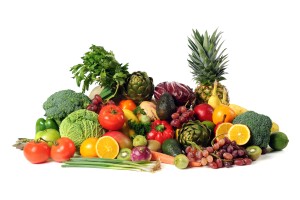Quality Fruits and Vegetables for Sperm Health
Antioxidants are required to protect both the vulnerable outer layer of sperm and the precious package of DNA it is carrying. Here at Glenville Nutrition we recommended eating at least 5 portions of vegetables per day and 2 portions of fruit to obtain a wide array of antioxidants and important vitamins and minerals necessary for sperm health. Not only that, but eating 5 or more portions of vegetables per day decreases risk for all-causes of death so the benefits are wide ranging.
However, as with many of the foods we eat today, there can be a downside to increasing your intake of any food type. Unless you are growing your own food or eating all organic, you can be sure that your food has been exposed to pesticides, fertilisers and many chemicals during its cultivation. By the time it reaches our supermarket shelves, there may be added preservatives or chemicals used to ripen it for example. A high intake of these chemicals has also been associated with health risks and sperm damage.
A recent scientific study has used reliable data on pesticide residue from the annual United States Department of Agriculture Pesticide Data Program. This data, along with a food questionnaire, assessed the impact of these chemicals on sperm health on a group of men attending a fertility clinic. It has been shown that increased intake of fruits and vegetables with high pesticide content reduced the sperm count by half. Almost a third more of the sperm were also abnormally formed.
If you are trying to increase your fruits and vegetables for your fertility, or general health, it would be worth considering trying to eat more organic foods. To help you identify which fruits and vegetables are the most contaminated, and therefore should be eaten organic whenever possible, you can check out this helpful list from the Environmental Working Group:
The ‘Dirty Dozen’ have the highest pesticide content:
Apples, celery, cherry tomatoes, cucumber, grapes, nectarines, peaches, potatoes, snap peas, spinach/ kale, strawberries and peppers
The ‘Clean Fifteen’ have the lowest pesticide content:
Asparagus, aubergines, avocados, cabbage, cantaloupe, cauliflower, grapefruit, kiwi, mangoes, onion, papaya, pineapple, sweetcorn, frozen peas, sweet potatoes
Sources
Environmental Working Group: ‘Dirty Dozen and the Clean Fifteen’ available online at http://www.ewg.org/foodnews/
Chiu et al 2015 Fruit and vegetable intake and their pesticide residues in relation to semen quality among men from a fertility clinic Human Reproduction 30(6) 1342
The full article is available from http://humrep.oxfordjournals.org/content/30/6/1342.full.pdf+html or the summary is printed here:
Fruit and vegetable intake and their pesticide residues in relation to semen quality among men from a fertility clinic
Chiu et al (2015) Hum Rep 30 (6) 1342
Abstract
STUDY QUESTION Is consumption of fruits and vegetables with high levels of pesticide residues associated with lower semen quality?
SUMMARY ANSWER Consumption of fruits and vegetables with high levels of pesticide residues was associated with a lower total sperm count and a lower percentage of morphologically normal sperm among men presenting to a fertility clinic.
WHAT IS KNOWN ALREADY Occupational and environmental exposure to pesticides is associated with lower semen quality. Whether the same is true for exposure through diet is unknown.
STUDY DESIGN, SIZE, DURATION Men enrolled in the Environment and Reproductive Health (EARTH) Study, an ongoing prospective cohort at an academic medical fertility center. Male partners (n = 155) in subfertile couples provided 338 semen samples during 2007–2012.
PARTICIPANTS/MATERIALS, SETTING, METHODS Semen samples were collected over an 18-month period following diet assessment. Sperm concentration and motility were evaluated by computer-aided semen analysis (CASA). Fruits and vegetables were categorized as containing high or low-to-moderate pesticide residues based on data from the annual United States Department of Agriculture Pesticide Data Program. Linear mixed models were used to analyze the association of fruit and vegetable intake with sperm parameters accounting for within-person correlations across repeat samples while adjusting for potential confounders.
MAIN RESULTS AND THE ROLE OF CHANCE Total fruit and vegetable intake was unrelated to semen quality parameters. High pesticide residue fruit and vegetable intake, however, was associated with poorer semen quality. On average, men in highest quartile of high pesticide residue fruit and vegetable intake (≥1.5 servings/day) had 49% (95% confidence interval (CI): 31%, 63%) lower total sperm count and 32% (95% CI: 7%, 58%) lower percentage of morphologically normal sperm than men in the lowest quartile of intake (<0.5 servings/day) (P, trend = 0.003 and 0.02, respectively). Low-to-moderate pesticide residue fruit and vegetable intake was associated with a higher percentage of morphologically normal sperm (P, trend = 0.04).
LIMITATIONS, REASONS FOR CAUTION Surveillance data, rather than individual pesticide assessment, was used to assess the pesticide residue status of fruits and vegetables. CASA is a useful method for clinical evaluation but may be considered less favorable for accurate semen analysis in the research setting. Owing to the observational nature of the study, confirmation is required by interventional studies as well.
WIDER IMPLICATIONS OF THE FINDINGS To our knowledge, this is the first report on the consumption of fruits and vegetables with high levels of pesticide residue in relation to semen quality. Further confirmation of these findings is warranted.
STUDY FUNDING/COMPETING INTEREST(S) Supported by National Institutes of Health grants ES009718, ES022955, ES000002, P30 DK046200 and Ruth L. Kirschstein National Research Service Award T32 DK007703-16. None of the authors has any conflicts of interest to declare.


